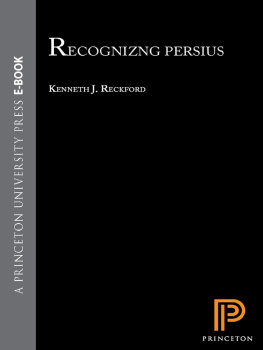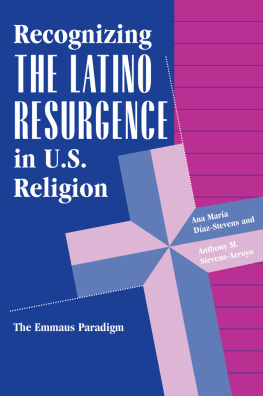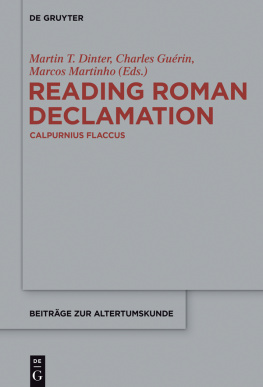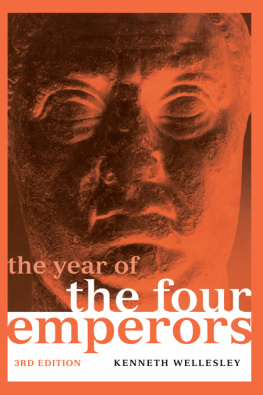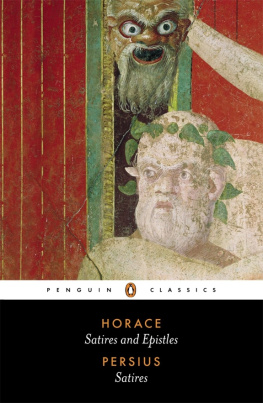Persius Flaccus Aulus - Recognizing Persius
Here you can read online Persius Flaccus Aulus - Recognizing Persius full text of the book (entire story) in english for free. Download pdf and epub, get meaning, cover and reviews about this ebook. City: Princeton (N.J.) etc, year: 2009, publisher: Princeton University Press, genre: Home and family. Description of the work, (preface) as well as reviews are available. Best literature library LitArk.com created for fans of good reading and offers a wide selection of genres:
Romance novel
Science fiction
Adventure
Detective
Science
History
Home and family
Prose
Art
Politics
Computer
Non-fiction
Religion
Business
Children
Humor
Choose a favorite category and find really read worthwhile books. Enjoy immersion in the world of imagination, feel the emotions of the characters or learn something new for yourself, make an fascinating discovery.
- Book:Recognizing Persius
- Author:
- Publisher:Princeton University Press
- Genre:
- Year:2009
- City:Princeton (N.J.) etc
- Rating:5 / 5
- Favourites:Add to favourites
- Your mark:
- 100
- 1
- 2
- 3
- 4
- 5
Recognizing Persius: summary, description and annotation
We offer to read an annotation, description, summary or preface (depends on what the author of the book "Recognizing Persius" wrote himself). If you haven't found the necessary information about the book — write in the comments, we will try to find it.
Recognizing Persius — read online for free the complete book (whole text) full work
Below is the text of the book, divided by pages. System saving the place of the last page read, allows you to conveniently read the book "Recognizing Persius" online for free, without having to search again every time where you left off. Put a bookmark, and you can go to the page where you finished reading at any time.
Font size:
Interval:
Bookmark:


The Martin Classical Lectures are delivered annually at Oberlin College through a foundation established by his many friends in honor of Charles Beebe Martin, for forty-five years a teacher of classical literature and classical art at Oberlin.
John Peradotto, Man in the Middle Voice: Name and Narration in the Odyssey
Martha C. Nussbaum, The Therapy of Desire: Theory and Practice in Hellenistic Ethics
Josiah Ober, Political Dissent in Democratic Athens: Intellectual Critics of Popular Rule
Anne Carson, Economy of the Unlost (Reading Simonides of Keos with Paul Celan)
Helene P. Foley, Female Acts in Greek Tragedy
Mark W. Edwards, Sound, Sense, and Rhythm: Listening to Greek and Latin Poetry
Michael C. J. Putnam, Poetic Interplay: Catullus and Horace
Julia Haig Gaisser, The Fortunes of Apuleius and the Golden Ass: A Study in Transmission and Reception
Kenneth Reckford, Recognizing Persius
Copyright 2009 by Princeton University Press
Requests for permission to reproduce material from this work should be sent to Permissions, Princeton University Press
Published by Princeton University Press, 41 William Street,
Princeton, New Jersey 08540
In the United Kingdom: Princeton University Press, 6 Oxford Street,
Woodstock, Oxfordshire OX20 1TW
ALL RIGHTS RESERVED
Reckford, Kenneth J.
Recognizing Persius / Kenneth J. Reckford
p. cm. (Martin classical lectures)
Includes bibliographical references and index.
ISBN 978-0-691-14141-1
1. PersiusCriticism and interpretation. 2. Satire, LatinHistory and criticism. I. Title.
PA6556R43 2009
871'.01dc22 2008048717
British Library Cataloging-in-Publication Data is available
This book has been composed in Janson Typeface
Printed on acid-free paper.
press.princeton.edu
Printed in the United States of America
10 9 8 7 6 5 4 3 2 1
For Charlotte

T HIS BOOK began as four Martin Classical Lectures at Oberlin College in April, 1999, under the auspices of Jim Helm and Tom Van Nortwick. I laid the groundwork for these lectures in Fall, 1998, as a pampered Resident in Classical Studies at the American Academy in Rome. Versions of sections 1.1 and 4.3 were given at the University of North Carolina at Chapel Hill, the University of Florence, and Washington and Lee University. Parts of 1.1 and especially 2.6 appeared earlier, in my 1998 Arethusa article; part of 1.2, in my Introduction to Cynthia Dessen's The Satires of Persius (2 ed., 1996). The book's eventual midwives were Tom Van Nortwick (again) for Oberlin and Rob Tempio for the Princeton University Press, aided by Heath Renfroe and Jon Munk, and earlier by two attentive readers who have since identified themselves as Dan Hooley and Cedric Littlewood. They will see for themselves how much I have profited from their generous advice and criticism.
My excitement about Persius goes back to Robert A. Brooks's Roman Satire course at Harvard in Spring, 1951. A multitalented teacher, scholar, poet, and (later) businessman and administrator [see my Introduction to Brooks 1981], Rab Brooks remarkably, and fatefully for me, preferred Persius to Horace and Juvenal. At UNC, between 1960 and 2003, I had the privilege of teaching Roman satire frequently to bright and gifted students, for whose interest, support, and friendship, together with that of my former UNC colleagues, I am forever grateful. More recently, the Department of Classics at Florida State University has welcomed me as a neighbor and allowed me to use the Strozier Library.
Scholars to whom I am indebted include, but are by no means limited to, the following: Susanna Braund, Marcia Colish, Nancy de Grummond, Sheila Dillon, Barbara Gold, Margaret Graver, Lois Hinckley, Nicholas Horsfall, John Kirby, Anthony Long, Mark Morford, Glenn Most, Jeanne Neumann, Michael Putnam, Gretchen Reydams-Schils, Niall Slater, Philip Stadter, Nicola Terrenato, and Jessica Wolf. Special thanks are due to Trevor Luke and Allen Romano at FSU, who helped me with elusive references and bibliography, and with inter-library loans; and to David Orth Reckford, for his unstinting assistance with computer problems, needs, and formatting, and his constant encouragement.
To Charlotte Orthwho, amid so many other generous gifts, has bade me welcome to her vast treasure house of fiction and nonfiction, and creative ideas; who has often improved my wording; who has teased me into reading theoretical studies beyond my habitual comfort zone, and thinking more modernly; who has prodded me to travel to placesOxford, London, Rome, Florencewhere I could listen to other scholars, study, and talk; and who, beyond all this, has done me the honor of believing that I could transcend my academic persona and become, or try to become, more of a personthis book is gratefully dedicated.

IN SEARCH OF PERSIUS
The first impression of an unbiassed reader who dips into the poemsis unfavorable. He is repulsed by the intolerably harsh and crabbed versification, by the recondite choice of theme and expression, and by the oddity of the thought. In time, however, he perceives that behind the fantastic garb of language there is an earnest and vigorous mind, an imagination that harbours fire within its cloudy folds, and an insight into the mysteries of spiritual life which is often startling.
E. G., in the Encyclopedia Britannica (1911)
T HE TWO missing words in the first line are, of Donne. Omit these, and Edmund Gosse might as well have been writing about Persius, who much influenced the harsh and crabbed late Elizabethan style of Hall, Marston, and Donne in their satires, and whose notorious obscurity they may have adopted, in some part, for their own protection. To the literary scholar, Donne's Satyres represent a high-water mark in the appreciation of Persius, who more than holds his own alongside Horace and Juvenal. Let me push the comparison further, as prologue to my account.
First, some external similarities. The little book (libellus) of Persius's six satires plus their choliambic preface adds up to 664 verses (14 + 650). He wrote them as a young man of around twenty-four to twenty-seven years; they were only published, perhaps for safety's sake, after his death. Donne's five satires add up to 669 verses. He wrote them between, roughly, twenty-one and twenty-seven, but withheld them from publication (to my Satyres there belongs some fear). They were published eventually, but never as a collection.
Then, style: Persius evidently taught Donne much about concise expression and complexity of syntax, rigorous argumentation, abrupt transitions in thought, hyperbolic and catachretical imagery, the drama and forcefulness of second-person addressmuch, in short, that readers have associated with Donne in general. James Baumlin points out that Donne adopts Persius's stylethe protreptic zeal, the homiletic tonewhen it suits his needs. satirists in their struggle for sincerity and truth, as against the usual, always tempting complicity in the rhetorical and linguistic corruptions and elegant flatteries of the time. Note, however, that Donne also satirizes Gloriosus in
Font size:
Interval:
Bookmark:
Similar books «Recognizing Persius»
Look at similar books to Recognizing Persius. We have selected literature similar in name and meaning in the hope of providing readers with more options to find new, interesting, not yet read works.
Discussion, reviews of the book Recognizing Persius and just readers' own opinions. Leave your comments, write what you think about the work, its meaning or the main characters. Specify what exactly you liked and what you didn't like, and why you think so.

